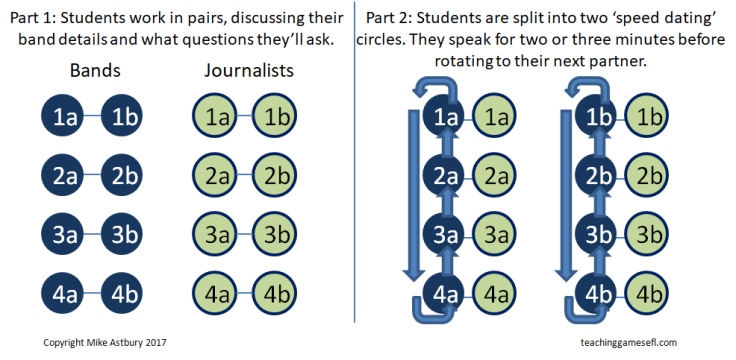If you haven’t heard of the alibi game you should read part 1 first by clicking here
The ‘alibi’ game requires students to invent a story in pairs and then recall the details, while being interviewed by other students. It’s fun because it involves creativity and role play within a context that feels realistic. It also allows for effective practice of the past tense and question forms.
The alibi game is extremely popular and I’ve seen numerous versions of it, but they’re usually restricted to police and their suspects. This post is looking at ways to take the ‘alibi’ format and make some new and interesting classroom activities that are adapted for different vocabulary sets and language structures.
Band interviews
I used a version of this activity with an upper-intermediate class. We had recently covered music, concerts and festivals, so we had reviewed the necessary vocabulary.
Split the class in two: half the students are musicians and half are journalists. Musicians work in pairs, or groups of three, to create bands. Each band needs a name, a style of music and each member needs to know their role in the band. Meanwhile journalists work in pairs, or groups of three, to create music magazines or blogs. Each one needs a name, a theme and a genre of music.
The bands should think about their style of music and background. They should also think about their image, reputation and what type of audience they want to attract. Journalists need to come up with questions for the bands. They should ask about basic details first and then try and ask some difficult questions that would provoke interesting answers for their readers
Depending on your students’ level, you might consider making some cards with pre-written roles as an option for students who find it too difficult. I spent a couple of minutes eliciting questions from the class and writing them on the board to help students get started.
Encourage students to be creative and give them time to think and develop their ideas. I allowed early finishers to create band logos or album cover art for their bands and magazine covers and website designs for the journalists.
The bands are told they’re going to be interviewed individually by influential music journalists. They’ll have to be interesting to appeal to their readers if they want to get headlines and attract new fans. However, they should consider that if the members of the band give wildly different answers, the journalists won’t believe their answers and they might not publish the interview.
For the interview stage, if you have even numbers, set up two ‘speed dating’ circles, where band members speak to journalists for two or three minutes each (see diagram below). Journalists must take notes during the interviews so that they can compare their answers with their partner after the speaking task.

If you have awkward numbers, band members spread out and stand still while journalists mingle as individuals, changing partners every two minutes. This can lead to the journalists competing to get answers to their questions. This could be imagined as a busy red carpet event or music festival, and works thematically as long as it doesn’t get too chaotic. Make sure that students don’t start congregating in big groups.
After the interviews, students go back to their partners. Bands discuss how they answered each question. Journalists discuss which two or three bands they’d like to feature in their magazine or blog. Just like ‘alibi’, there’s a level of detective work for students when they meet back up with their partners.
If journalists discover that members of a band gave different answers to their questions, they may not feel confident in publishing the interviews or may even write a negative article about the band. You can then feedback as a while class, or in several groups, to see which bands will be featured by which journalists.
Adaptations
If you have time to repeat the activity, so that students have an opportunity to play both roles, students can use the notes they took during their turn as journalists for a follow up written task where they write an article about the bands they interviewed.
You could design similar ‘alibi’ activities by using the same format with a variety of different contexts. Here are a few ideas:
- Businesses with a sales pitch looking for money from investors
- Flatmates looking for accommodation from letting agents
- Friends booking a package holiday with travel agents
In each case you include the concept of students planning in pairs before being interviewed individually. They then have to keep their story straight so they’re not revealed to be lying or otherwise unsuitable.
What other situations could you apply an ‘alibi’ style game to? Do you have any role-play activities that could be improved with elements of deception and investigation?
Thanks for reading!
You can follow the site by clicking the box below the comments, find me on Facebook and follow me on Twitter.

Leave a comment